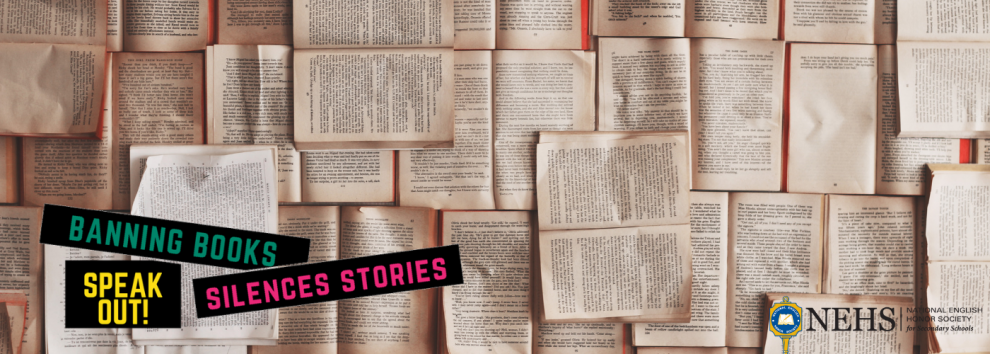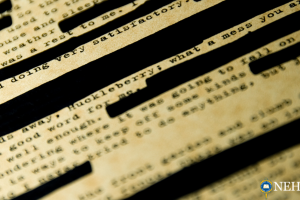As Banned Book Week, sponsored by the American Library Association, is celebrated in the coming week and beyond, there looms an urgency in society as teachers, students, and educational institutions, along with news outlets, book publishers, and libraries, are bombarded with outright censorship or, at the very least, imposed bold or subtle restrictions on the “students’ (and many others’) right to read.” In this issue of the NEHS Museletter, we share three items related to the challenges spotlighted by Banned Book Week. Zoe Pratts, a winner of the NEHS Intellectual Freedom Challenge last year, shares her thoughts on actions all of us should consider taking; the 2018 Intellectual Freedom Challenge information invites sophomore and junior members of NEHS to write about potentially challenged texts; and we announce a return of social media contest sponsored by Sigma Tau Delta and NEHS. Enjoy!
The liberties that the Constitution’s First Amendment protects—freedom of religion, speech, press, petition, and assembly—collectively make up “freedom of expression.” Courts have long recognized that true freedom of expression only exists when there are no obstructions upon people’s access to information. As the United Nations Universal Declaration of Human Rights states, “Everyone has the right to freedom of opinion and expression; this right includes freedom to hold opinions without interference and to seek, receive, and impart information and ideas through any media and regardless of frontiers.” Intellectual freedom is this ability to hold, receive, and disseminate ideas as one pleases.
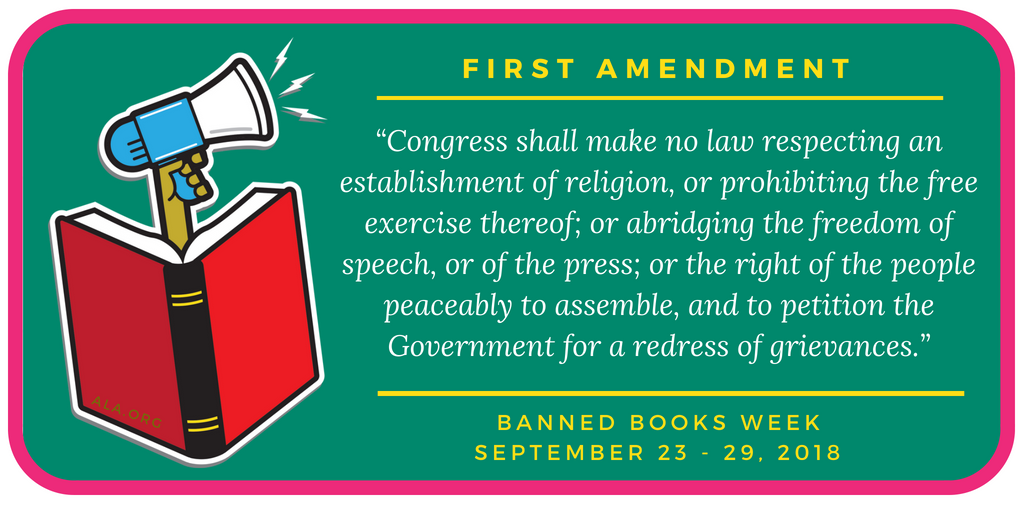 Free public education embodies one of the First Amendment’s chief goals: to create an informed population that can effectively engage in politics and self-government. However, concerned parents have targeted public schools for decades, seeking to eliminate certain books, plays, and films from school curricula because of the materials’ depictions of violence, references to sexuality, use of profanity, or other elements seen as damaging to “family values.” While the attempt to keep children pure for as long as possible is admirable, it leaves gaping holes in their education and ultimately prevents them from living their best life. Public distaste for the contents and perceived messages of books (such as the frequently-challenged Catcher in the Rye) may result in them being banned, censored, or labeled in a certain way. However, it is important that students be able to exercise their First Amendment right to read controversial works and make their own judgements about the merits of such works. Censorship also harms teachers by limiting their resources and flexibility. This reduces instruction to bland, formulaic exercises and discourages meaningful discussion. In classrooms, the least controversial materials are also the least relevant. A school whose curriculum does not contain any “offensive” works would hardly be able to satisfy students’ curiosities or prepare them for real life. The exclusive utilization of “safe” materials would lead to a narrow worldview with holes in children’s cultural and international education. This would lower their tolerance of diversity and ultimately their ability to succeed in professional life; a businessperson who cannot connect with members of a different religion, for example, will not last long in any business looking to expand internationally.
Free public education embodies one of the First Amendment’s chief goals: to create an informed population that can effectively engage in politics and self-government. However, concerned parents have targeted public schools for decades, seeking to eliminate certain books, plays, and films from school curricula because of the materials’ depictions of violence, references to sexuality, use of profanity, or other elements seen as damaging to “family values.” While the attempt to keep children pure for as long as possible is admirable, it leaves gaping holes in their education and ultimately prevents them from living their best life. Public distaste for the contents and perceived messages of books (such as the frequently-challenged Catcher in the Rye) may result in them being banned, censored, or labeled in a certain way. However, it is important that students be able to exercise their First Amendment right to read controversial works and make their own judgements about the merits of such works. Censorship also harms teachers by limiting their resources and flexibility. This reduces instruction to bland, formulaic exercises and discourages meaningful discussion. In classrooms, the least controversial materials are also the least relevant. A school whose curriculum does not contain any “offensive” works would hardly be able to satisfy students’ curiosities or prepare them for real life. The exclusive utilization of “safe” materials would lead to a narrow worldview with holes in children’s cultural and international education. This would lower their tolerance of diversity and ultimately their ability to succeed in professional life; a businessperson who cannot connect with members of a different religion, for example, will not last long in any business looking to expand internationally.
Censorship sows the seeds of bigotry and can be damaging to children’s ability to succeed later in life. Here is what you can do to preserve intellectual freedom in your communities:
Administrators and Teachers
Keep parents informed about the materials students will use. Always have a rationale for the materials employed, regardless of whether it seems controversial. Be willing and available to meet with parents and discuss their concerns. If possible, schedule regular meetings for parents.
Librarians
Advocate for less censorship in your schools and communities, and engage with those in favor of censorship. In South Carolina, librarian Pat Scales held discussions with parents once a month to discuss works that their children might be reading, in order to understand how the books might help their children grow intellectually and emotionally and to encourage parents to discuss books with their children.
Parents
Involve members of the community in debates over challenged materials. Broadening the discussion usually reveals that only a small number of people object to the same material or on the same ground. Donate your time or money to organizations dedicated to intellectual freedom, such as the American Civil Liberties Union (ACLU), National Coalition Against Censorship (NCAC), Freedom to Read Foundation (FTRF), or the American Library Association’s Office for Intellectual Freedom (OIF).
Students
Let your voice be heard! Write an editorial in your local paper in support of the First Amendment. Attend a school board meeting and speak about what materials you believe should be included in curricula. Enter in the National English Honor Society’s Intellectual Freedom Challenge.
 Zoe Pratts
Zoe Pratts
Intellectual Freedom Challenge Winner, 2017-2018
York Suburban High School Chapter
York Suburban High School, York, PA
2018 Banned Books Week Social Media Contest
In celebration of Banned Books Week Sigma Tau Delta and National English Honor Society are teaming up to host the third annual Banned Books Week social media contest. To participate you must tag us in a post on any of the following social media accounts: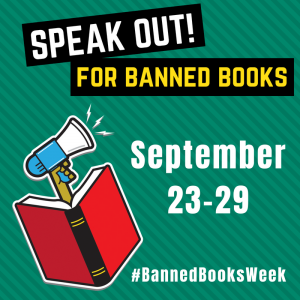
- NEHS Facebook
- NEHS Twitter (@NEHSXpress)
- Sigma Tau Delta Facebook
- Sigma Tau Delta Twitter (@EnglishCon)
- Instagram (@EnglishMatters)
- or snap us at englishmatters on Snapchat
What to do in your post:
Books are banned for a variety of reasons. Take a photo of your favorite banned book and share with us (on one social media platform) one of the reasons it has been contested. If you wish to post on a second platform, please choose a second banned book to post about.
The contest will run from Sunday, September 23-Saturday, September 29. Everyone who participates during this time frame will be entered in a drawing to win one of three $25 Amazon gift cards. A $45 Amazon gift card also will be awarded for the best overall post.
The Intellectual Freedom Challenge
Timed to coincide each year with the celebration of Banned Books Week, NEHS encourages participation in the Intellectual Freedom Challenge. Sophomore and junior NEHS members are invited to submit essays dealing with a text that may be perceived by some as controversial. Students are to submit essays that delineate a careful argument for the inclusion of the text for classroom study or support restricting the text in some way. Sigma Tau Delta university professors and members of the National Advisory Council of NEHS evaluate the essays; the best essays garner monetary awards for the students ($100 plus a $25 Better World Books certificate) and their chapters ($50). Essays may be submitted from September 4 through October 22.
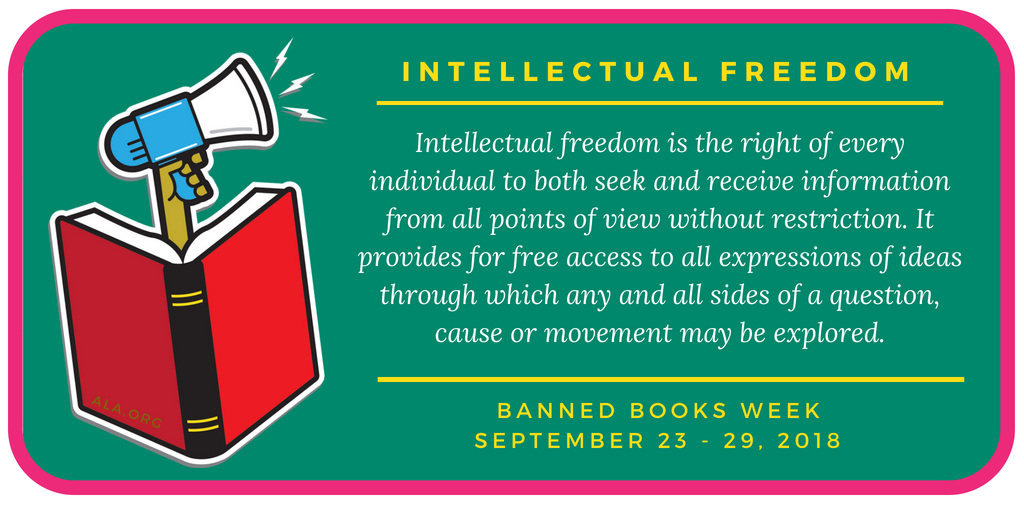 Intellectual Freedom Challenge Submission Guidelines
Intellectual Freedom Challenge Submission Guidelines
Overview
Guidelines and Procedures
Censorship and Reading Links


